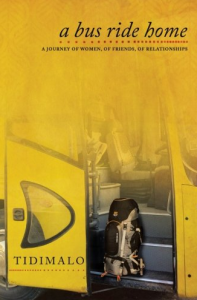
The flashbacks can be a bit confusing at first. Sometimes the transition from Tlotlego’s past to the present is a little abrupt. However, as the story goes on, this becomes easier to follow. The frame device itself is extremely successful. Tlotlego meets an intriguing fellow hiker on the bus. She does not tell him her history but instead reflects on that history as he probes and questions her about her ability to manage the hike and her willingness to accept help should that become necessary. The discussion of the hike they are about to take and her reminiscences about previous hikes reinforce the themes of the novel.
Tlotlego has three close female friends, Pelontle, Kgopolo, and Amantle. Recounting the lives and loves (mostly stories of bad marriages and lousy boyfriends) of these three takes up a large part of the book. They are an unlikely but warm and loving group of friends. The banter and affection among them is amusing and at times heartwarming. All four women have been unlucky in love, and with only two exceptions, men come off rather poorly in this novel, and marriage fares even worse. It is very much a post-feminist story, featuring accomplished, independent women trying to work out how relationships with men fit into this new paradigm. At times the book seems almost dated, and often presents an immature view of relationships. For example, this description of a happy couple:
Those around them could only envy the harmony that their life was. They were always happy. They could display their affection by holding hands and making silly gestures.
One of the friends, Kgopolo, has excellent business skills, yet lets a husband ruin their joint business while she runs the household, buys expensive clothes and shoes, and collects an “allowance” from her husband. After that marriage is over, she looks for men who have money so they can provide for her. The women seem to be trying to impose a pre-feminist template on very modern lifestyles, but can’t quite figure out why it is not working.
Our hero, Tlotlego, manages a bit better. She is the conscience of the book: the good one who overcomes a mild drinking problem, doesn’t indulge in social media, and always seems to see both sides of her friends’ disputes. Her story, while involving its share of tragic history, is at root a love story. Tlotlego has to learn far more about herself and how she wants to live in the world before she commits to a relationship she has rekindled with a childhood boyfriend. That’s where the frame device comes in. Hikes (both the one she is on her way to and the others mentioned in the narrative) serve as a metaphor for how people deal with the challenges they encounter in life.
. . . this walk can humble even the toughest person. There comes a point where you don’t have a choice but to surrender . . . .
In addition to the stories of love and failed love, this book offers an interesting glimpse of life in post-independence South Africa as well as a nuanced look at social and political attitudes among middle-class Africans toward AIDS.
Readers who enjoy books with plenty of bestie bonding and romantic angst but crave a little more depth will find plenty here to entertain and intrigue.
Links
Amazon
Barnes & Noble
Get an Editorial Review | Get Amazon Sales & Reviews | Get Edited | Get Beta Readers | Enter the SPR Book Awards | Other Marketing Services






















Leave A Comment